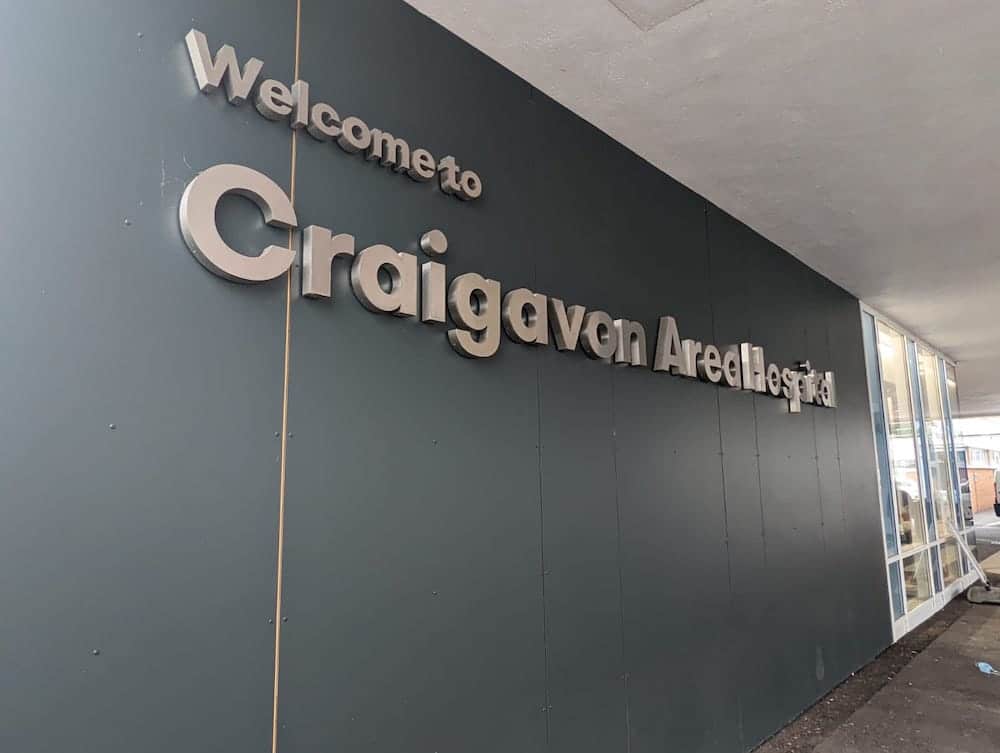
Chair of the board of the Southern Health & Social Care (HSC) Trust, Eileen Mullan has issued a heartfelt apology to all the women who are in the process of having their smear tests reviewed.
At a Trust board meeting held on Thursday (April 25), Mrs Mullan also wished to thank ‘Ladies with Letters’ representatives, Heather Thompson and Tracey Bell, for speaking out on the issue, and for attending the meeting.
The Trust board chair stated: “I want to acknowledge Heather Thompson and Tracey Bell on how, from the outset, they have provided valuable patient feedback through the ‘Ladies with Letters’ group.
“We are sincerely sorry for any anxiety or concern this process is causing to women affected, but it’s important to reiterate that this is a precautionary measure to ensure that your previous smear test result was correct.

Chair of the board of the Southern HSC Trust, Eileen Mullan MBE. Credit: Southern HSC Trust
“We do continue to provide support to women through our Freephone information line, 0800 9520255.
“Frequently-asked questions and other information is on our website, and we also have a dedicated patient liaison team who have been working with women on a one-to-one basis, and that will continue.
“We thank you for your engagement and patience while the Trust completes this large-scale review.”
Southern Trust medical director, Dr Stephen Austin, was anxious to reassure women affected by the current review, saying: “The Southern commenced this vital screening review towards the end of 2023.
“At that time, letters were sent to women, notifying them that their cases would be reviewed as a precautionary measure, and since this time, the overall review has progressed using three main pathways.
“Cytology slides are retained for 10 years, and for most women their historical cytology slides are being reviewed.
“The overall review is progressing well and the cervical screening review is now complete for almost 11,000 women. That’s 61% in total.
“All these cytology slides are [also] being reviewed by the other Trusts in Northern Ireland, and we are grateful to the staff of the laboratories in the Belfast, Northern and Western Trusts who have stepped up and are providing important work in reviewing cytology slides.
“This is very much appreciated by the Southern trust and Public Health Agency, as this works is providing reassurance to women.
“It’s very important to recognise that screening will never be able to detect all abnormalities, and cannot prevent all cases of cervical cancer, but it is designed to reduce the overall number of cases of cervical cancer in Northern Ireland.
“Until the Southern Trust review is complete, full results will not be available. However, to date, the vast majority of previous smear results are unchanged and have been confirmed.
“In a review of this size, it is expected that some abnormalities will be found. The overall review [shows] abnormalities in a very small number, and that’s less than five, a very small proportion of the overall slides reviewed.
“This, however, does not mean that cancer has been found. Rather, these women need to be followed up for further investigation and management and support, as required.
“Today, we are announcing an additional phase of the review. Of the women impacted by the review announced last October, some 3,000 have had a more recent smear [test] undertaken through the NI screening programme.
“Since these women have received the results of this up-to-date test, there was no clinical reason to review their previous slides.
“However the Trust and the PHA colleagues have listened to feedback, which has indicated that women in this group would value having their previous slides reviewed.
“Therefore an additional phase for the review has been added to the cervical screening review, to provide extra reassurance for this group of impacted women.
“It is expected that work on the additional phase will begin after the [current] review is completed, and that all will be completed by the end of summer.
“The Trust has written to these women to advise them of the decision. These letters are being received this week.
“Our decision is not based on clinical grounds or any new concerns. Rather, it is intended to provide maximum reassurance to women involved.
“This will also mean that by the end of the summer, all available slides that we have will have been reviewed, and this will give us as complete a picture as possible of the overall risks arising from the screening performance issues.
“The strong support from colleagues in Belfast, Northern and Western Trust laboratories into this additional work will likely extend the overall slide review process, but only by a matter of weeks.
“It is important to emphasise again that cervical screening is not a diagnostic test. It is for people with symptoms, and the aim is to detect early changes that could go on to develop as cervical cancer if left untreated.
“Again, we advise anyone with symptoms that they should always seek advice from their GP.
“The trust continues to maintain a dedicated helpline for the cervical review, managed by highly skilled staff who are available and ready to offer support to women.
“The helpline is open Monday to Friday, from 10am to 4pm. Women can [also] leave their name and they’ll be contacted the next working day.
“Women with a confirmed diagnosis of cervical cancer in Northern Ireland do have their screening history reviewed if they’ve gone through screening.
“This is established normal practice and happens on an ongoing basis, but it’s separate from the Southern Trust review.
“We do continue to encourage women to come forward for smear tests when invited.
“Finally, I’d like to recognise the impact that the review has had on women impacted, and again I’d like to apologise on behalf of the Trust for the distress this has caused.”
Deputy director of Public Health at the Public Health Agency (PHA), Dr Tracy Owen was keen to reassure women that screening procedures are of the highest standards: “[I would like] to provide some context and clarity around the routine screening programme.
“The PHA has been working very closely with the Trust throughout this whole issue, and dealing with all elements of the review right from the beginning, and we’re going to continue to do that over the coming months.
“I also want to acknowledge the extensive input we’ve had to this review from the other Trusts, which has enabled us to progress the review as well as we have.
“The staff and the other labs in Northern Ireland have gone above and beyond to support this work.
“And there’s a lot of other changes happening in labs at the moment, like a new IT system being rolled out. But like us, they have recognised the importance of giving all women within this review an outcome, on an individual basis, as soon as possible.
“I want to say a few words about what screening programmes can and cannot do.
“Screening programmes are not diagnostic tests. They [serve] to identify the small proportion of individuals in the population who may be at risk of a disease and need further investigation.
“No screening programme is 100% effective, and they’re actually designed to achieve a balance between picking up as many people with the disease as possible, without tipping the other way [with] an unacceptable rate of overdiagnosis.
“So in the design of screening programmes, they are never going to be 100% effective at picking up all cases of disease. And that applies to all screening programmes.
“In the case of cervical screening, it’s expected that cytology-based screening, which is what we had, will only pick up three in every four cervical abnormalities that are there. So it will not pick up one in every four people with abnormalities.
“Participating in screening is about reducing your risk of disease, it is not about eliminating your risk of disease.
“But screening does save lives. Our labs in Northern Ireland process about 120,000 cervical screening tests every year. We have about 80 cases of cervical cancer diagnosed in Northern Ireland each year.
“We have one of the lowest rates in the UK, if not the lowest rate, and it’s much lower than in the Republic of Ireland. But we would likely have hundreds of cervical cancers each year if we didn’t have a screening programme, and women didn’t attend.
“In December we introduced a change to the screening programme in terms of a new pathway, called Primary HPV Testing. It is now the screening test of choice globally.
“It means that all samples are tested for the presence of a high-risk human papillomavirus.
“High-risk HPV is directly linked to 99.7% of cervical cancers. So it means we would only expect to see one cancer every four years in Northern Ireland which is not HPV-related.
“Primary HPV Testing is a much more effective way than cytology in identifying women who are more likely to go on to develop cervical cancer.
“If HPV is present, the sample is then examined under a microscope to look for cell changes as well.
“Moving to primary HPV is going to allow us to identify more women with cervical abnormalities that may be significant in terms of [being] likely to develop into cancer than what cytology does.”
Cathrine Reid, Trust director of Surgery & Cancer Services, acknowledged the distress which many women are experiencing due to the current review: “I realise this is a very anxious time for the ladies.
“this is a very complex process. And I would ask that they work with us as we continue through this process as quickly as possible.
“I would urge women to continue to come forward for their smears when they’re invited. It is vitally important.”



